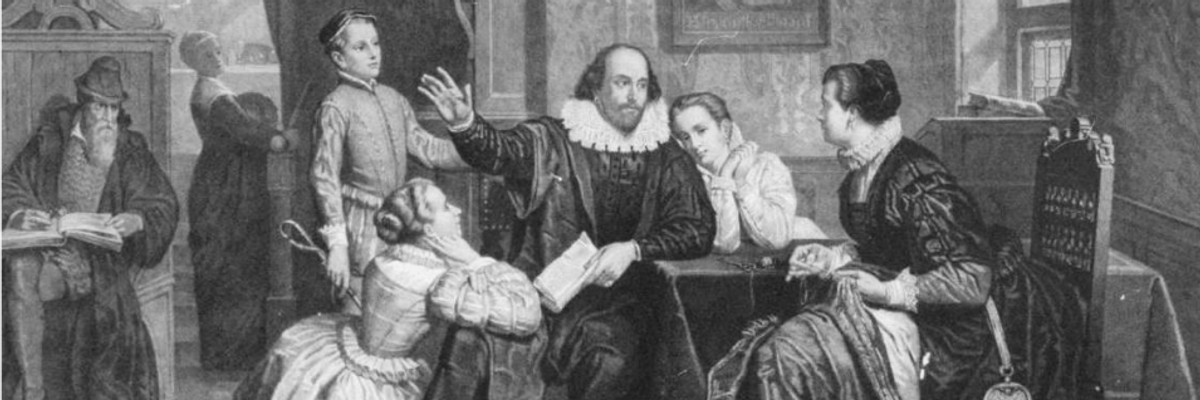In July 1564, William Shakespeare was three months old when the plague hit his parent's Henley Street neighborhood in Stratford-on-Avon. Mary Arden and John Shakespeare locked their doors and sealed their windows to try and keep the disease at bay, and whether through good fortune, basic hygiene, or snug window frames and door jambs, the future Bard of Avon and his family were spared.
Some 40 years later, at the height of his creative powers, Shakespeare was in London, living in a small room on Silver Street, near St. Giles Church. According to Shakespeare scholar James Shapiro and others, Shakespeare had another "near death" experience with the plague, one that produced unexpectedly "tragic" consequences: the Sonnets and two great tragedies may owe their existence to Elizabethan public health policies.
"In the dark times
Will there also be singing?
Yes, there will also be singing."
--Bertolt Brecht
The Queen's Master of the Revels had closed the theatres as a means of preventing the spread of an outbreak of plague. Shakespeare's Globe theatre could hold as many 2500 people, who attended not only matinee stage plays, but morning bouts of bull and bear baiting. The Globe, Curtain, Swan, Fortune, Rose and other theatres could accommodate as much as 2 percent of the entire population of London in a day. Not only were the close (and unsanitary) quarters of the theater a health issue, but transmissions through contact with ferry boatmen, coachmen, the cooks, servants and hostesses in pubs and inns, not to mention in the "stews" or brothels that the theatre district of Southwark was noted for, were highly likely and impossible to stop.
With the London theater closed, Shakespeare and his company, so some speculate, toured the countryside and even, possibly, Germany. Others think this was the period in which Shakespeare worked on many of his Sonnets (which were printed in 1609). In any event, during the period of 1605 to 1606, Shakespeare wrote two of his greatest tragedies: Antony & Cleopatra and King Lear.
Shakespeare's company, The King's Men, were also able to take over the indoor Blackfriars theater because the plague had decimated the boy companies that had played there. The fact that Shakespeare returned to post-plague London to write more intimate indoor plays (as opposed to those for the open air Globe) gave us his late "Romances": Pericles, The Winter's Tale, and The Tempest among them.
So... Broadway is dark. Local theaters are closed. Productions, readings, concerts (including some of my own) are cancelled, which will, undoubtably, not only bring significant hardship to theaters and individual artists, performers, and technicians, but also to the taxi, Lyft and Uber drivers, parking attendants, restaurant owners and their staffs, baby-sitters, bartenders and many more.
Still... My point is that there will be a silver lining, even if we cannot see it at this moment. Creative people will not only survive, they will create. As Bertolt Brecht wrote in one of his poems:
In the dark times
Will there also be singing?
Yes, there will also be singing.
About the dark times.

